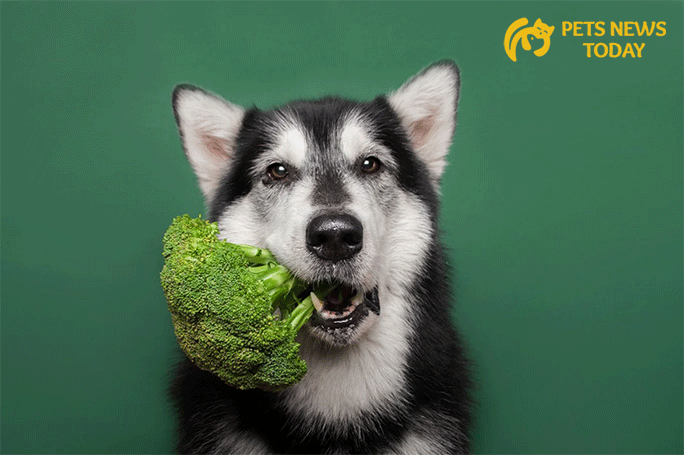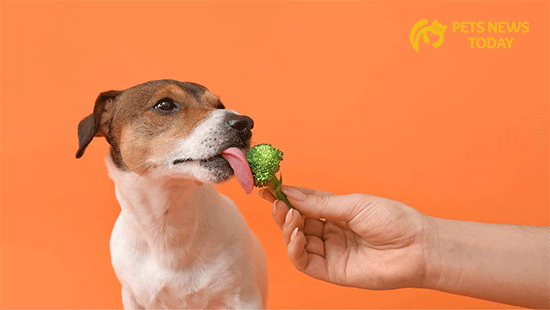The Ultimate Guide: Can Dogs Eat Broccoli? Everything You Need to Know

Although broccoli is a nutrient-dense vegetable that is rich in vitamins and minerals, can dogs consume broccoli without risk? It is critical for responsible pet owners to be aware of the advantages and disadvantages of giving their animals broccoli. In this extensive guide, we will explore the subject of dogs and broccoli, providing insights into its nutritional benefits and offering tips on how to safely introduce it into your dog’s diet.
Can dogs safely eat broccoli?

Yes, dogs can safely eat broccoli in moderation. It has all the necessary nutrients, including vitamin C, vitamin K, fiber, and antioxidants, that can help maintain your dog’s overall well-being. However, there are a few important things to keep in mind when it comes to feeding broccoli to your furry friend.
Potential Advantages of Including Broccoli in a Dog’s Diet:
- Nutritional Value: Broccoli contains essential vitamins and minerals that can greatly benefit dogs. It provides vitamin C, which helps boost their immune system, and vitamin K, which contributes to blood clotting and bone health.
- Fiber Content: Broccoli contains fiber that can help support healthy digestion and regular bowel movements in dogs. Including broccoli in your dog’s diet can aid in preventing constipation and promoting a healthy digestive system.
- Antioxidants: Broccoli is packed with antioxidants that have the potential to reduce inflammation and provide protection against chronic diseases in dogs. These compounds can play a role in promoting overall health and well-being.
- Low in Calories: Broccoli is low in calories and fat, making it a healthy snack option for dogs, especially those who are overweight or prone to obesity. It can be used as a low-calorie alternative to traditional dog treats.
How to Feed Broccoli to Your Dog:

When feeding broccoli to your dog, follow these guidelines to ensure their safety and enjoyment:
- Cooked vs. Raw: While dogs can eat both cooked and raw broccoli, cooking can make it easier for dogs to digest and may help break down tough fibers. Steaming or boiling broccoli until it’s soft is the best cooking method for dogs.
- Cut into Bite-Sized Pieces: Cut broccoli into small, bite-sized pieces to prevent choking and make it easier for your dog to chew. Avoid feeding large florets or stems, as they can be difficult for dogs to eat.
- Moderation is Key: While broccoli can be a healthy addition to your dog’s diet, it should be fed in moderation. Too much broccoli can lead to digestive upset, including gas, bloating, and diarrhea. Start with small amounts and monitor your dog’s response.
- Monitor for Allergic Reactions: Some dogs may be allergic to broccoli or develop gastrointestinal issues after eating it. Monitor your dog for any signs of allergic reactions, such as itching, swelling, or vomiting, and discontinue feeding broccoli if any adverse reactions occur.
Potential Risks of Feeding Broccoli to Dogs:

While broccoli is generally safe for dogs, there are a few potential risks to be aware of:
- Gas and Bloating: Broccoli contains fiber and sugars that can ferment in the gut, leading to gas and bloating in some dogs, especially those with sensitive stomachs. Monitor your dog for signs of gastrointestinal upset after eating broccoli.
- Choking Hazard: Large pieces of broccoli or stems can pose a choking hazard, especially for small dogs or those who gulp their food without chewing. Always supervise your dog while they’re eating broccoli, and cut it into small, manageable pieces.
- Thyroid Issues: Broccoli contains compounds called isothiocyanates, which can interfere with thyroid function in dogs if consumed in large quantities. While occasional broccoli consumption is unlikely to cause issues, avoid feeding excessive amounts to your dog, especially if they have thyroid problems.
Ultimately, incorporating broccoli into your dog‘s diet can provide them with a nourishing and beneficial boost, as long as it is given in appropriate amounts. It provides a variety of potential health benefits, such as vitamins, fiber, and antioxidants. It is important to gradually introduce broccoli into your dog’s diet and keep an eye out for any digestive issues or allergic reactions. By following the recommendations provided in this article, you can safely introduce broccoli into your dog’s diet and promote their overall health and well-being.



